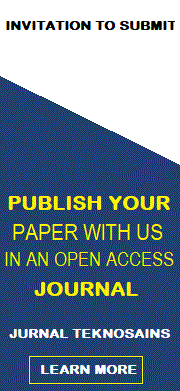OPTIMIZATION OF MUNICIPAL WASTE COLLECTION POINTS IN YOGYAKARTA CITY- INDONESIA
Bertha Maya Sopha(1*), Alditya Perkasa Sri Haryoto(2)
(1) SCOPUS ID= 35729832600, Gadjah Mada University, Department of Mechanical and Industrial Engineering, Yogyakarta
(2)
(*) Corresponding Author
Abstract
Keywords
Full Text:
PDFReferences
Agha, S. R., 2006, Optimizing Routing of Municipal Solid Waste Collection Vehicles in Deir El-Balah – Gaza Strip, The Islamic University Journal, 14(2), 75-89.
Aremu, A., S., 2011, Optimization and Assessment of Waste Bin Locations Using Geographic Information System, available online: http://www.unilorin.edu.ng/publications/asaremu/13_AremuConf_2011.pdf, accessed on June 2013.
BadanPusatStatistik, 2010, Laporan Eksekutif Hasil Sensus Penduduk 2010 Provinsi Daerah Istimewa Yogyakarta, Badan Pusat Statistik Kota Yogyakarta, Yogyakarta.
Bhambulkar, A. V., 2011, Municipal Solid Waste Collection Routes Optimized With ArcGis Network Analyst, International Journal of Advanced Engineering Sciences and Technologies, 11(1), 202-207.
Karadimas, N.,Kolokathi, M., and Loumos, V, 2007, Municipal Waste Collection of Large Items Optimized with ArcGis Network Analyst, Proceedings 21st European Conference on Modelling and Simulation, 4-6 June 2007, Prague, Czech Republic.
Pramitaningrum, E., 2013, Pengembangan Model untuk Memonitor Sampah di Kota Yogyakarta dengan Pendekatan Bayesian Network, Undergraduate thesis, Fakultas Teknik Universitas Gadjah Mada, Yogyakarta.
Prastawa, D. M., 2012, Optimasi Rute Pengambilan Sampah Berbasis Vehicle Routing Problem, Undergraduate thesis,Fakultas Teknik Universitas Gadjah Mada, Yogyakarta.
Tjandra, S. A., Erkut, E., Karagiannidis, A., dan Perkoulidis, G., 2006, A Multicriteria Facility Location Model for Municipal Solid Waste Management in North Greece, European Journal of Operation Research, 187(3), 1402-1421.
Yogyakarta Environmental Agency, 2013, Jumlah sampah dan biaya tetap harian.
Article Metrics
Refbacks
- There are currently no refbacks.
Copyright (c) 2017 Bertha Maya Sopha, Alditya Perkasa Sri Haryoto

This work is licensed under a Creative Commons Attribution-ShareAlike 4.0 International License.
Submit an Article Tracking Your Submission
Editorial Policies Publishing System Copyright Notice Site Map Journal History Visitor Statistics Abstracting & Indexing










